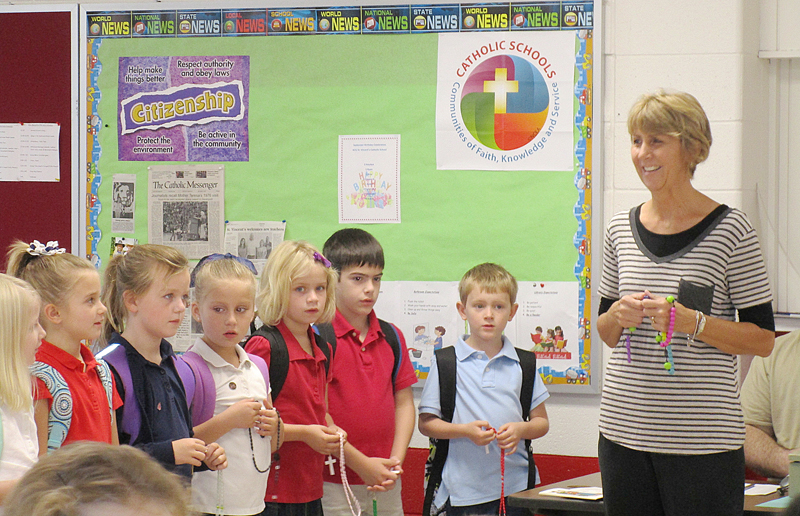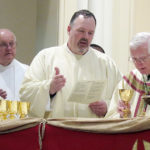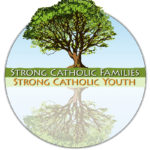By Barb Arland-Fye
The Catholic Messenger
Supporters of Catholic schools in the Diocese of Davenport are in the midst of developing action plans that will ensure the schools’ relevancy, viability and effectiveness in passing on the faith and developing tomorrow’s leaders.

St. Vincent School-Keokuk teacher Shelley Williams leads students in praying the rosary earlier this month.
The behind-the-scenes work is in response to the Diocesan Board of Education’s approval of the final draft of a strategic plan titled “We have faith in our Catholic schools.” The plan, adopted Nov. 13, 2015, seeks to raise the bar of excellence in diocesan Catholic schools in four key areas: mission and Catholic identity, academic excellence, leadership and governance, and operation vitality.
“Our diocesan schools have a long track record of success, but there is always room to reach an even higher level of excellence in all of our schools,” said Superintendent of Schools Lee Morrison. He shared with The Catholic Messenger a progress report on the strategic plan. Among the goals and details:
• The Office of Catholic Schools, in collaboration with school leaders, will develop a Diocesan Rubric to measure Catholic identity and faith formation at all schools.
Rubrics will be in place for the 2017-18 academic year, and a significant rollout for these standards will take place next spring. The Catholic identity committee is nearing completion of the rubrics, Morrison said. Father Tony Herold, the diocese’s vicar general and pastor of St. Paul the Apostle Parish in Davenport, leads the committee.
• Each Catholic school will develop a clear understanding of its financial vitality with clear knowledge of current income and expenses, including elements such as tuition revenue and tuition assistance, parish investment, fund raising and development, salaries and benefits, direct and indirect instructional and administrative costs, operational expenses and cost per pupil. Financial vitality should take into account enrollment capacity, future projections and knowledge of parishes and the community.
• A Financial Vitality Steering Committee has designed a process for the uniform collection and comparison of school budget data. Also, the committee developed an instrument to measure financial vitality for all Catholic schools. Data collection will be completed before Christmas. With these tasks completed, the committee is to define the challenges the Catholic schools face and to suggest solutions to the financial challenges the schools face. Tom Daniels chairs this committee.
• Catholic schools will identify changing demographics and develop appropriate marketing, enrollment management, marketing strategies, and communication models to serve the needs of the local faith community.
A committee was formed to develop a template for marketing and enrollment management to guide those activities at all diocesan Catholic schools.
The template is in development and a reference source of great marketing practices is being compiled for schools. The committee hopes to have the new marketing materials available for Catholic Schools Week in January. Julie Delaney, principal of St. Paul the Apostle Catholic School and Jeanne Von Feldt, principal of All Saints Catholic School, both in Davenport, are co-chairing this committee.
The Office of Catholic Schools will take leadership in ensuring that all diocesan policies, procedures, forms and plans are updated by fall 2016. This work includes cross–referencing as necessary with other diocesan policies in areas outside of Catholic schools.
Morrison said documents have either been developed or completely rewritten regarding the process for hiring principals and for hiring teachers, the Pastors Handbook for Catholic Schools, and manuals for Board of Education members. All documents on the Catholic Schools website were completely revised.
The Offices of Catholic Schools and Faith Formation will develop committees of existing principals, faith formation representatives and Board of Education members to update these plans and policies related to faith formation and education and faith formation guidelines.
The document, Policies for Faith Formation and Education programs, has been completely reviewed and revised. The document aligns with Chapter 12 of the Iowa Code and National Catholic Education Association (NCEA) guidelines. The first draft of the New Faith Formation guidelines were approved but put on hold due to a change in personnel.











